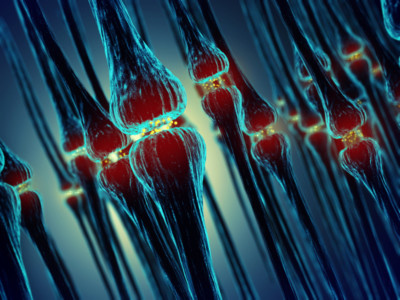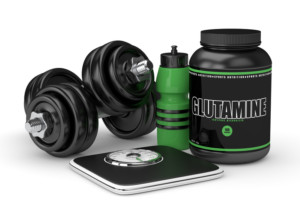
Glutamine is a popular supplement for athletes. Buy the bestselling glutamine supplements from Amazon.com
Contents
What is glutamine?
Glutamine is one of the non-essential amino acids in humans. Although the body can produce it, immune system weaknesses and nerve problems can occur during times of high demand.
Our body uses L-glutamine to create proteins, so-called amino sugars, and to support the production of the super-antioxidant glutathione. The body also uses this amino acid to:
- increase water retention in muscle cells
- help signal cell growth and to
- start intensifying production of protein and glycogen.
Therefore it is a very popular supplement with strength athletes.
Among the free amino acids in human blood, glutamine is the most abundant at around 20% of the total. It also exists in a peptide-bonded state, which makes it chemically very stable.
Uses of glutamine
The body typically lacks glutamine during times of metabolic ill-health. Examples are post-surgery recovery periods or when suffering from injuries or burns. This often means that appropriate supplementation becomes necessary.
This versatile amino acid also plays a role in the synthesis of amino sugars and other protein chains in the body. This means that it is especially useful for tissues with a high cell division rate.
Examples of these tissues include:
- the immune system
- the mucous membrane cells in your small intestine
- cells in the mouth, such as those on the tongue
- cells of the musculoskeletal system, especially in athletes.
Glutamine also enables the production of the natural antioxidant glutathione, a known preventer of cell damage. It also protects cells against oxidising free-radicals and can thus act against the development of cancer too.
As if that were not enough, this amino acid regulates the stability of acids and bases in the body. This keeps the various proteins effective in fulfilling their various roles in the body. This in turn ensures the correct execution of metabolic processes.
Dietary sources
The recommended minimum dose of L-glutamine is around 10g per day. This can be higher if certain specific factors are in play. In most need are competitive athletes and patients with liver or kidney diseases, who frequently need higher doses of up to 40g a day. In these cases, it is useful to use nutritional supplements to meet your body’s requirements. The need for glutamine can also rise sharply during chemotherapy, when supplements can often be helpful again.
Natural foodstuffs tend to contain relatively low levels of this amino acid. Furthermore glutamine is denatured by heat. This means that heat damages its chemical structure and diminishes its properties.
Keeping products which contain L-glutamine in direct sunlight over long periods will therefore result in a continual reduction of the vital amino acid. It is best to store these products in a cool, dark place.
Aside from cheese, the German cottage-cheese like product quark is particularly rich in glutamine. Milk and yogurt are also good sources of glutamine, although they contain markedly less in comparison.
Raw and smoked meat, soya and wheat products are also dietary sources of this amino acid. You can use all of these products to achieve your recommended daily dose.
Glutamine supplements
If you take supplements, there are different recommendations for the best time to take these. This is because scientists disagree on when your body can absorb the most glutamine. The strongest theory states that the best regimen is to consume supplements both in the morning and the evening.
To best strengthen your immune system, scientists recommend taking one dose of 5g after getting up and another 5g before going to bed. If you are aiming to build muscle mass with higher glycogen storage in your muscle tissue, you should take around 5 to 10 grams before and after working out.
It is best to check that any supplements will not interfere with any existing health conditions or medications by discussing these with your doctor.
Health Benefits
Protein building
This amino acid is used to create proteins and is therefore involved in the composition of many protein products. Amongst other functions, it helps to create so-called amino sugars, which assist the body in combating problems like osteoarthritis. It also supports the production of glutathione.
Benefits in athletes
Glutamine has positive effects on Human Growth Hormone maintenance, cell volume, and protein substrate recycling for increased protein synthesis.
These advantages make it a sensible anabolic supplement which is beneficial and popular with bodybuilders. Supplementation of 5-10g a day is beneficial to restore lost glutamine in muscle cells1.
Additionally, this amino acid puts pressure on fluid retention in cells so that the cell volume can ultimately increase.The body takes this increase in cell water retention as a signal for cell growth and starts to intensify production of protein and glycogen with the aim of increasing the performance of muscle cells.
At the same time, it prevents muscle catabolism and improves your body’s ability to recover during sleep.
Digestive system
Because this amino acid provides energy to the digestive cells, it aids those cells in their regeneration and renewal. Therefore it supports the absorption ability of the intestine.
Furthermore, diseases in the digestive system like Crohn’s disease are almost always accompanied by reduced permeability of the intestinal wall. This ultimately leads to poor utilization of vitamins from the food you have eaten.
Indian researchers have investigated glutamine and they found that taking L-glutamine supplements as part of your diet (0.5g per kilo of body weight) can drastically increase intestinal permeability and thus improve the intake of the vital substances coming into your body2.
Immune system
Cells which divide quickly, such as those in the immune system, are very reliant on having a good supply of L-glutamine. This is why medical procedures like bone marrow transplants have much lower death rates when a targeted supplementary regime containing this amino acid has been given beforehand.
Nervous system

Glutamine is important for the nervous system. Buy the bestselling glutamine supplements from Amazon.com
Glutamine has important uses in the nervous system. This is because it is chemically similar to the neurotransmitter glutamic acid.
To transport messages in the body, the nerve cells must be stimulated successfully sequentially in a row. After the initial stimulation, the neurotransmitter has to be transported back to the earlier cell which previously released it in order to pass along the message.
When back in the old cell, the body converts the neurotransmitter into glutamine so that it does not accidentally excite the next cell and send a false message. In this way, a second and unwanted stimulation of the nerve cells can be avoided. Finally, glutamine is turned back into glutamic acid for the cycle to start again when needed.
As L-glutamine also has a certain antioxidative potential, it can also protect human cells from destruction by free radicals. It is therefore able to, up to a certain point at least, prevent degenerative neurological illnesses like Alzheimer’s or Parkinson’s disease.
Cancer treatment
Another important field of application for this amino acid is in cancer treatment. In the past, scientists carried out several studies demonstrating its effects against tumours 3.
In their conclusions the researchers showed that appropriate L-glutamine supplementation can considerably improve the metabolism and entire clinical state of cancer patients without increasing tumour growth.
They found that glutamine positively affects, among other things,
- an increase of the immune system’s activity,
- increased rate of cell renewal and,
- a stronger creation of glutathione.
Furthermore, this amino acid can lower the risks of chemotherapy and radiotherapy which reduces the strain on these patients’ health.
Glutamine deficiency
If your glutamine levels drop to lower than your body needs, the consequences can be serious. Not consuming enough L-glutamine over long periods of time can lead to your immune system having lower levels of activity and problems with absorbing vitamins.
Thus, not only do you then have a higher risk of infections, but also a lack of many other important nutrients because your intestine has not managed to absorb all the nutrients from food you have consumed, leaving them unused.
If your body is suffering from an infection or trauma, the amount of free glutamine in your body’s muscle systems will reduce by up to 50%, and symptoms like tiredness and fatigue will occur. Similarly, levels are lower if you have a demanding training regimen. In order to avoid this consequence, L-glutamine supplements can be used, which will then improve the abilities of your immune system and stop inflammation at the same time4.
Glutamine or glutamate?
Glutamate is a flavour enhancer which originates from the Far East. As it is an edible product, it is permitted by many laws regulating nutrition in amounts of up to 10g per kilo of food.
Glutamate is the salt of glutamic acid. It is therefore chemically not comparable to, nor to be confused with, the amino acid glutamine.
As a food additive, companies should identify the different forms of glutamate on packaging using the E-numbers E621 to E625. Companies prefer, however, to label their food with words like ‘spices’ or ‘yeast extract’, which is also permitted.
Scientists have not proved any toxic effects of glutamate in high doses yet. In the 1940s children were administered with over 40g of glutamate per day over several months. At the time, people thought it could boost intellectual abilities. Neither an intellectual increase nor long-term toxic effects could be proven by the study.
However if you are taking supplements, you should make sure you follow the instructions on the packaging and do not exceed the maximum recommended dose.
Conclusion
Glutamine is not an essential amino acid because the body can synthesise it, but it is popular in sports and weight training to avoid muscle catabolism post workout. It has many uses including providing energy for all of your cells. It also regulates the stability of acids and bases in the body and thus keeps proteins active. Due to its multitude of positive benefits, scientists have started to use L-glutamine in treatments of illnesses such as cancer and Crohn’s. It can efficiently and effectively alleviate symptoms and lead to a faster recovery.
References
- Matt Samuels, RD. Glutamine and its Role in Athletic Performance. Available from: http://www.afpafitness.com/articles/articles-and-newletters/research-articles-index/nutrition-wellness/glutamine-and-its-role-in-athletic-performance/ ↩
- Benjamin J et al.: Glutamine and whey protein improve intestinal permeability and morphology in patients with Crohn´s disease: A randomized controlled trial; Dig Dis Sci, 2011 Oct 26 ↩
- Katharina S Kuhn et al.: Glutamine as indispensable nutrient in oncology: experimental and clinical evidence; European Journal of Nutrition, Volume 49, Number 4/ June 2010 ↩
- Aostini, Francesco; Biolo, Gianni: Effect of physical activity on glutamine metabolism; Current Opinion in Clinical Nutrition & Metabolic Care; January 2010 – Volume 12 – Issue 1 ↩




